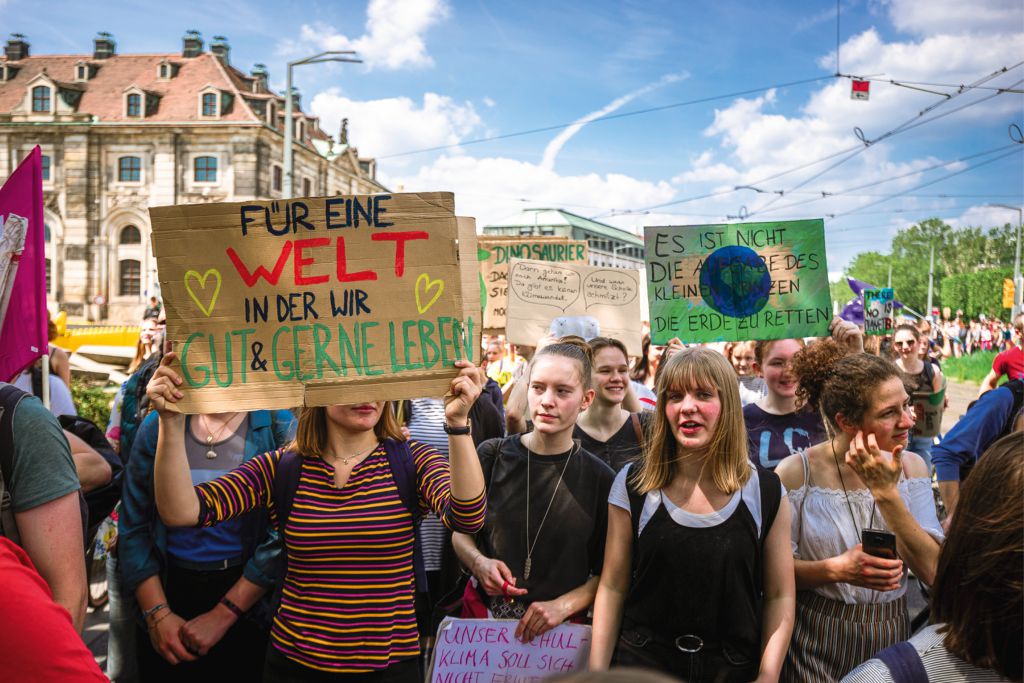In der Ausgabe 9/2019 der nmz (Neue Musikzeitung) hat der deutsche Komponist und Musikvermittler Bernhard König einen Text mit dem Titel Monteverdi und der Klimawandel veröffentlicht. Für viele war dieser Artikel ein wichtiger Denkanstoß. Schon der Titel symbolisiert die Frage, die sich uns im Kulturbereich beziehungsweise an einer Universität tätigen Menschen stellt: Was kann ich in meinem Tätigkeitsbereich für den Klimaschutz tun? Und die schnell parate Antwort: Das hat doch nichts miteinander zu tun! Oder doch?

Einerseits bleibt ambitionierten jungen Künstler_innen keine Wahl, wenn sie Karriere machen wollen – Mobilität scheint unabdingbar: Konzertreisen, Wettbewerbe, Meisterkurse, Auslandssemester, Aufrechterhaltung der Präsenz im Herkunftsland, wenn man woanders studiert … – Ohne internationale Vernetzung geht nichts! Internationalität bedeutet Reisen, bedeutet auch Flugreisen, bedeutet somit Treibhausgasemissionen.
Natürlich hat jede_r Einzelne innerhalb dieser Rahmenbedingungen einen gewissen Spielraum: Bei jeder einzelnen Reise kann man sich folgende Fragen stellen:
- Lohnt sich diese Reise wirklich?
- Kann ich mit dem Zug fahren, statt zu fliegen?
- Kann ich einmal länger bleiben, statt mehrmals hinzufahren?
- Kann ich direkt fliegen, statt umzusteigen?
Vorschläge für eine ökologisch ausgerichtete Mobilitätsstrategie werden in der neu gegründeten Senats-Arbeitsgruppe an der mdw diskutiert und erarbeitet.
Gleichzeitig müssen wir uns bewusst sein: Die Rahmenbedingungen werden sich ändern – so oder so! Die Möglichkeit, so viel zu fliegen, wird es wohl bald nicht mehr geben, wie auch PKW-Reisen nicht mehr selbstverständlich sein werden. Entweder uns gelingt ein geordneter, sanfter Übergang zu einer nachhaltigen Wirtschafts- und Lebensweise oder wir stehen vor einem Zusammenbruch der bisherigen Systeme – inklusive des Kulturbetriebs. Wenn wir uns diese Realität vor Augen halten, anstatt den Kopf in den Sand zu stecken, sind wir bald bei der Frage: Wollen wir Teil der Lösung sein oder Teil des Problems? Wollen wir den Wandel aktiv mitgestalten oder so lange wie möglich an etwas festhalten, das nicht zukunftsträchtig ist? Es ist die gleiche Frage, vor der die Menschen in den Kohleregionen stehen und die Länder, die (noch) von Erdölförderung abhängig sind.
Wenn wir nun weiter fragen: „Welcher Wandel? Wie wünschen wir uns unsere Kultur-Landschaft überhaupt? Worauf kommt es an?“, werden wir überrascht sehen, dass ein und derselbe Ansatz auf vielfältige Weise gesellschaftspolitisch wirksam sein und die Lebensqualität steigern kann. Eine Ökologisierung des Kultursektors durch Aufwertung regionaler Strukturen und einer breiteren Verankerung in der Bevölkerung könnte Chancen für die Kulturschaffenden bringen.
Was ist eigentlich eine erfolgreiche Karriere? Wenn wir ganz von vorne beginnen, mit der Frage nach dem Sinn im (Künstler_innen-)Leben, wenn wir uns fragen, was uns erfüllt und befriedigt, kommen wir vielfach zu anderen Zielen und einer anderen Lebensplanung als wenn wir „den großen internationalen Durchbruch“ suchen.
Wenn Erfolg bedeutet, Menschen mit unserer Kunst zu erreichen, wenn unser Tun dadurch Sinn bekommt, dass wir auf Resonanz stoßen, dann bedeuten Preise bei Wettbewerben oder internationale Engagements noch lange kein glückliches, erfolg-reiches Leben.
Wenn wir uns aber realistischerweise eingestehen, dass wir mit leerem Magen auch nicht glücklich sein können, also die soziale Frage stellen, müssen wir umso mehr Reformbedarf feststellen. Derzeit sind diejenigen gut abgesichert, die eine Stelle bekommen. Aber wie viele Künstler_innen haben kein Engagement? Wie viele Musiker_innen kommen nicht in einem Orchester unter (von einer internationalen solistischen Karriere ganz zu schweigen) oder müssen mit wenigen Stunden an einer Musikschule auskommen? Wie viele Schauspieler_innen halten sich mit Grabreden, Gelegenheitsjobs und Sozialhilfe über Wasser? Das derzeitige System belohnt einige wenige, während viele unter prekären Bedingungen arbeiten.
Die mdw wird nicht darauf verzichten können und wollen, „dabei“ zu sein: Unter denjenigen, die „es schaffen“, die engagiert werden, die sich international etablieren, sollen viele unserer Absolvent_innen sein. Aber im elitären, stark internationalisierten Sektor des Kulturbetriebs haben nur wenige von uns Platz. Hier spielen nur die künstlerischen „Eliten“ für die „Eliten“ der Gesellschaft. Und es ist damit zu rechnen, dass es dort oben noch enger wird, die Luft dünner, wenn die ökologischen Folgekosten eingepreist werden und immer weniger Menschen daran teilhaben können.
Hoffentlich wird weiterhin ein repräsentativer Anteil dieser künstlerischen Eliten von der mdw kommen. Daneben aber müssen wir uns genauso um die vielen kümmern, die die vielzitierte „Patchwork-Karriere“ vor sich haben. Dieses Berufsbild gilt es positiv zu definieren. Es gilt die vielen Herausforderungen zu identifizieren, die unsere Absolvent_innen bei ihren unterschiedlichen Tätigkeiten erwarten und ihnen in der Ausbildung Rechnung zu tragen. Es gilt die Trennung zwischen Konzerte spielen und unterrichten, zwischen Künstler_in und Publikum in unseren Köpfen aufzubrechen. Letztlich sind wir alle „Kulturvermittler_innen“ im weitesten Sinne, ob wir nun in einem Konzertsaal spielen oder in einem Pensionistenheim singen, mit Flüchtlingskindern ein Theaterprojekt durchführen, eine Veranstaltungsserie programmieren oder zu Kulturthemen forschen und publizieren. Es gilt die Kultur in den Regionen zu verankern, unter aktiver Einbindung der dort lebenden Menschen. Es gilt unsere Rolle in der Gesellschaft wahrzunehmen: Jede Kulturveranstaltung bedeutet soziale Interaktion, jedes Kulturprojekt ist ein Sozialprojekt.
Es gilt die Kulturlandschaft so mitzugestalten und mitzupflegen, dass möglichst breite Schichten möglichst aktiv daran partizipieren können – dann haben wir auch darin eine Zukunft!
Die vom Senat ins Leben gerufene Arbeitsgruppe Klimaschutz steht allen mdw-Mitarbeiter_innen und Studierenden offen, die sich in diesem Bereich engagieren wollen. Bis jetzt widmen sich ca. 25 Personen aus allen Bereichen der mdw in einzelnen Teams u. a. den Themen Mobilität, Gebäude-Energie-Heizung, Lehre und Forschung, Beschaffung.
Anlässlich der Präsentation der Treibhausgasbilanz der mdw findet im Sommersemester 2020 eine Podiumsdiskussion statt. Geladen werden Vertreter_innen aus der Film-, Theater-, Musikbranche um gemeinsam über Zukunftsperspektiven nachzudenken:
„Zukunftsmusik“ – Internationale künstlerische Karrieren trotz Klimakrise!?
Mittwoch, 1. Juli 2020, 17.00 Uhr
Livestream über die mdwMediathek

